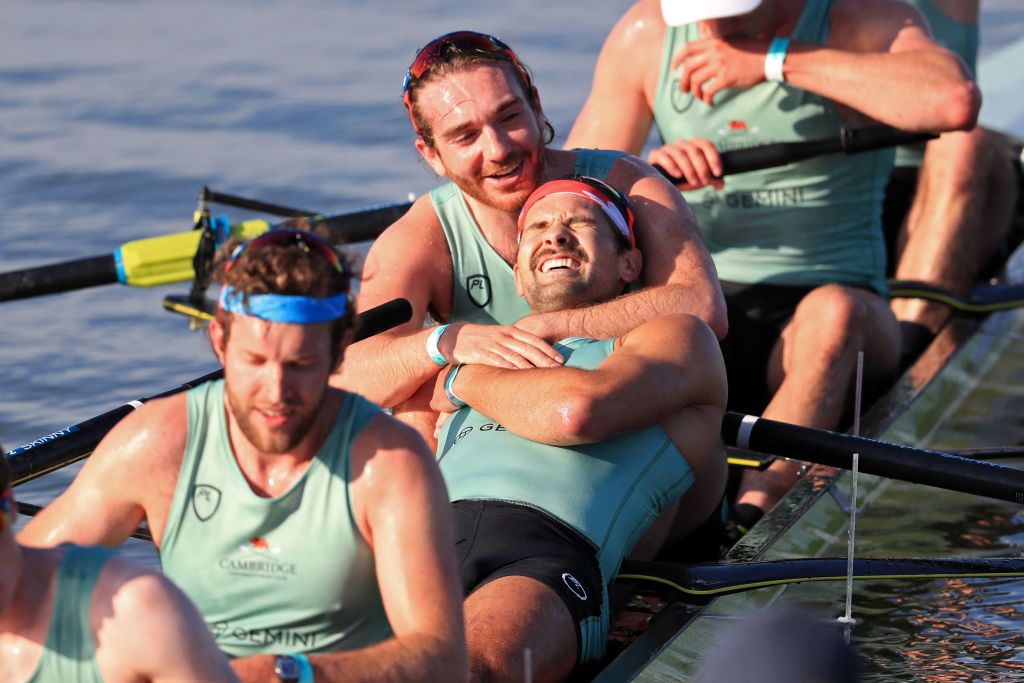At some point in every sensitive young Oxonian’s life he admits that he should have gone to Cambridge. Since graduating I have found it so much lovelier and livelier than dreary Oxford. Had I my time again I’d join the Tabs, not shoe them. Disillusioned as I am, however, every year I summon up some residual loyalism for the annual peak of the Oxbridge calendar: the Boat Race.
God knows why I bother. In the six races since I matriculated, Oxford’s men have won only once, and the women not at all. My Boat Race Day usually entails a dejected (and expensive) tour of Putney’s pubs. Yet I still join the hundreds of thousands who line the Thames each year, participating in a tradition stretching back to 1829, when Cambridge first challenged Oxford for a prize of 500 guineas.
But Oxford’s luck might be on the turn. This week brought the news that students in post-graduate teacher training have been barred from competing for the first time, based on the PGCE not being a ‘degree-level qualification’. This means that three Cambridge rowers across the men’s and women’s eights – including Matt Heywood, a two-time winner of the Under-23 men’s world title – can’t compete.
Also barred has been Tom Ford, who won gold for Team GB in Paris last year. Despite having enrolled in an MBA and competing in several test races for Cambridge, Ford is among three further rowers who have fallen foul of rules designed to stop exclude anyone who first began a degree more than 12 years earlier. Unsurprisingly, our light blue confrères haven’t taken the news well.
Reigning ladies’ Olympic champion Imogen Grant – a Boat Race winner in 2017, 2018, and 2022 – took to Instagram to declare she was ‘seething’. The exclusions were not only ‘a desperate ploy’ by Oxford to ‘gain an upper hand in the most slimy way’, but ‘an insult to teachers everywhere’. James Cracknell – two-time gold medal winner, and 2019 victor – labelled Ford’s exclusion ‘a real travesty’.
Cry me a Championship Course. Not to be unsporting, but if either university can be accused of ‘slimy’ practices, it is undoubtedly Cambridge. Ford’s barring is a result of Cracknell’s own participation. Having come out of retirement at 46, he embodied the inescapable sense that the race’s traditional amateurism is being replaced by a distasteful, all-consuming pursuit of victory.
Each year, a hundred-plus million viewers do not tune in to watch because they want to see, as Grant claims, ‘the best race’ between ‘the best crews’. We’ve the Olympics for that. The Boat Race is not just any old elite sporting competition, but a unique 200-year-old struggle for honour, prestige, and clout at the college bar. It shouldn’t be taken too seriously.
Let’s restore the original spirit of the Boat Race
Back in the 1980s, Boat Race crews were considered a joke by international oarsmen. But there has since been ongoing quest for hiking standards. Sponsorships deals and the endless, rigorous and tedious – for those less aquatic students hearing about it night-in, night-out – practice suggest the death knell of the race’s once-heralded ‘Corinthian’ spirit. The incentive to parachute in professionals is clear.
Let’s restore the original spirit of the Boat Race. At a decade older than the next oldest-ever competitor, Cracknell was no bright young thing when he won six years ago. Ford and the PGCE three would this year have taken up positions once the reserve of normal undergrads. They were excluded because by an independent panel concluded that the PGCE was a diploma, not a degree. It might seem snobbish, but if it is a step towards repairing the contest, so be it.
As disappointing as the ruling might be for them personally – and for any Cantabrigian now a little more nervous for 13 April – it has clarified what makes the Boat Race special. A mood of détente should now replace the ringer arms race. And just as Oxford still went on to win after the mutiny of our own American imports back in 1987, Cambridge should sod the ruling, and triumph anyway.








Comments